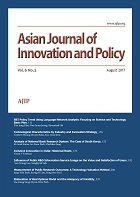Applying a Two-Stage Option Games Method to Investment Decisions of Business Startups: Case Study of a Smart House Startup in Indonesia
Fujiwara, Takao (Toyohashi University of Technology)
Abstract
In this paper, we present a case study of a new emerging business startup involved in smart house appliances. The irreversible investment concept and real-option theory are introduced as the fundamentals of the model. By using games theory we show that the startup's actions can trigger reactions from other firms. The first part covers initial the research and development stage, while the second part covers production and commercialization. The findings of this study suggest that, given a certain amount of initial investment, an open and shared innovation may lead to hurting a firm's investment while strengthening the competitors' position in the market. However, given the sensitivity analysis, when volatility and demand grow favorably, sharing R&D investment is not a bad option for a new player to adjust its position in the market while still maintaining positive returns.
- keywords
- Real options approach, game theory, flexibility, two-stage game, smart house company
참고문헌
Aye, N.N. and Fujiwara, T. (2014) Application of option-games approach to the irreversible investment for a new energy industry in Myanmar by simple one-stage strategic model: focused on potential of smart house, Global Journal of Flexible Systems Management, 15(3), 191-202.
Azevedo, A. and Paxson, D. (2014) Developing real option game models, European Journal of Operational Research, 237(3), 909-920.
Cheah, C.Y. and Liu, J. (2006) Valuing governmental support in infrastructure projects as real options using Monte Carlo simulation, Construction Management and Economics, 24(5), 545-554.
Chan, M., Campo, E., Estève, D. and Fourniols, J.Y. (2009) Smart homes-current features and future perspectives, Maturitas, 64(2), 90-97.
Copeland, T. and Antikarov, V. (2001) Real Options, New York: Texere.
Dimakopoulou, A.G., Pramatari, K.C. and Tsekrekos, A.E. (2014) Applying real options to IT investment evaluation: the case of radio frequency identification (RFID) technology in the supply chain, International Journal of Production Economics, 156, 191-207.
Dongping, Y. (2009) Strategic R&D investment: a game theoretic real options approach, Control and Decision Conference.
Fernandes, B., Cunha, J. and Ferreira, P. (2011) The use of real options approach in energy sector investments, Renewable and Sustainable Energy Reviews, 15(9), 4491-4497.
Fujiwara, T. (2014) Real options analysis on strategic partnerships of biotechnological start-ups, Technology Analysis and Strategic Management, 26(6), 617-638.
Ha, N.T. and Fujiwara, T. (2015) Real option approach on infrastructure investment in Vietnam: focused on smart city project, Global Journal of Flexible Systems Management, 16(4), 331-345.
Hyuk, L. (2011) A real option approach to valuating infrastructure investments, Master thesis, KDI School of Public Policy and Management, Https://archives.kdischool.ac. kr/bitstream/11125/1205/1/LEE,%20Hyuk.pdf
Smit, H.T.J. (2003) Infrastructure investment as a real option games: the case of European airport expansion, Finanencial Management, 32(4), 27-S7.
Smit, H.T.J. and Trigeorgis, L. (2007) Strategic options and games in analysing dynamic technology investments, Long Range Planning, 40(1), 84-114.
Smit, H.T.J. and Trigeorgis, L. (2009) Valuing infrastructure investment: an option games approach, Califonia Review Management, SI(2), 79-100.
Solaimani, S., Bouwman, H. and De, R.M. (2010) Smart home: aligning business models and providers processes; a case survey, Proceedings of 21st ACIS, 55-81.
Song, M., Wang, T. and Parry, M.E. (2010) Do market information processes improve new venture performance?, Journal of Business Venturing, 25(6), 556-568.
Suttinon, P., Bhatti, A.M. and Nasu, S. (2011) Option games in water infrastructure investment, Journal of Water Resources Planning and Management, 138(3), 268-276.
Panayi, S. and Trigeorgis, L. (1998) Multi-stage real options: the cases of IT infrastructure and international bank expansion, part 2, Quarterly Review of Economics and Finance, 38(3), 675-692.
- 다운로드 수
- 조회수
- 0KCI 피인용수
- 0WOS 피인용수


